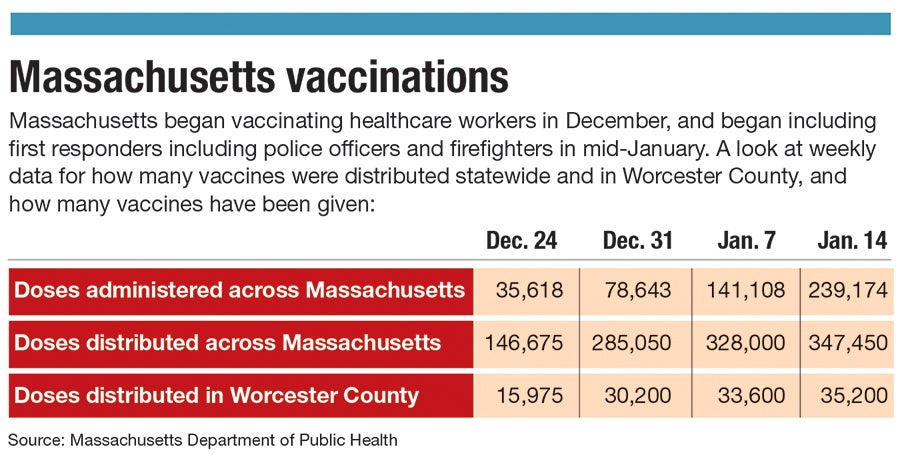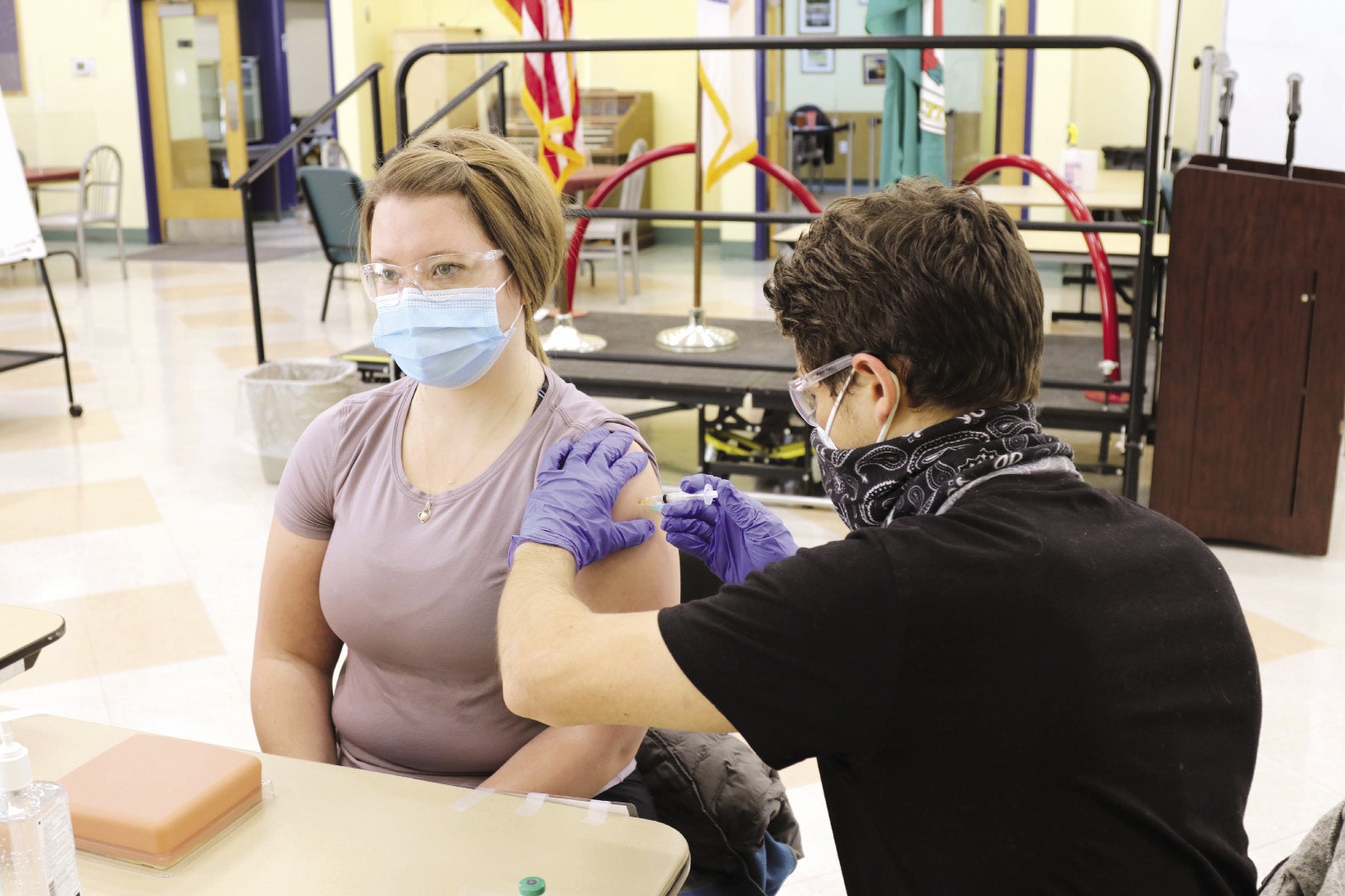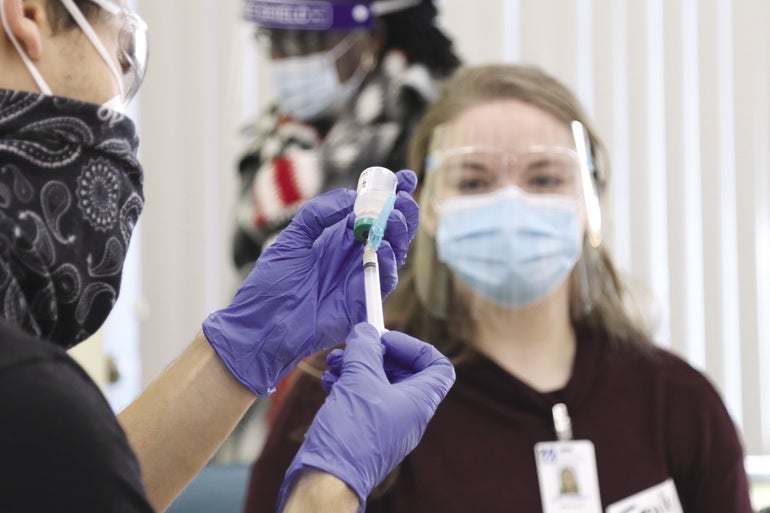Massachusetts has millions of residents to vaccinate in hopes of ending the coronavirus pandemic. UMass Medical School hopes it can serve as a testing ground for how to quickly administer doses statewide – and potentially beyond.
Get Instant Access to This Article
Subscribe to Worcester Business Journal and get immediate access to all of our subscriber-only content and much more.
- Critical Central Massachusetts business news updated daily.
- Immediate access to all subscriber-only content on our website.
- Bi-weekly print or digital editions of our award-winning publication.
- Special bonus issues like the WBJ Book of Lists.
- Exclusive ticket prize draws for our in-person events.
Click here to purchase a paywall bypass link for this article.
Massachusetts has millions of residents to vaccinate in hopes of ending the coronavirus pandemic. UMass Medical School hopes it can serve as a testing ground for how to quickly administer doses statewide – and potentially beyond.
To start, it may all depend on how things go in Worcester.
UMass Medical School students – both nursing students and the School of Medicine students they’ve trained to give shots – began administering the first vaccines on Jan. 11 to the first few hundred police officers, firefighters and other first responders in Worcester and six adjacent towns.
Before too long, leaders of the effort will review what worked best and what didn’t in order to gauge how such an effort could be replicated elsewhere in the state.
The program may be tapping into a broad eagerness in the medical community to play a role in helping to bring an eventual end to the coronavirus pandemic, which has killed more than 400,000 Americans.
“I sense that there’s a desire for national purpose at the moment,” UMass Medical School Chancellor Dr. Michael Collins said. “We all have to come together.”

Training a team in Worcester
In Worcester, that begins with students like Jacqueline Mbugua, a UMass Medical School student who’s studying to become a family nurse practitioner in UMass’ graduate school of nursing. Mbugua was among nursing students who trained roughly 160 medical students a few days before vaccinations began.
“It’s been extremely exciting for me,” said Mbugua, who, as a woman of color, said she feels a particularly strong responsibility to help fight the pandemic. Minority communities have been acutely hit by the virus.
“For me, it’s really been an opportunity I didn’t see coming,” she said.
Jill Terrien, a UMass Medical School professor who is helping to lead the program, began talking to students as early as last fall about training for vaccinations. That early-stage focus mirrors in many ways what was another key moment locally: when the medical school graduated its doctoral students early so they could join the pandemic fight in local hospitals. That effort was initiated by students who told Collins they wanted to help.
Like Mbugua, Terrien finds the effort both medically critical and inspirational.
“It’s an awesome feeling, and it’s hopeful,” she said.
That doesn’t mean the effort has been as smooth or easy as it may look.

Planning and replicating
The pandemic is about a year old, but the school’s mass vaccination efforts date back more than a decade when H1N1, or the swine flu, hit. In early 2020, school leaders dusted off that plan and began to think about how it could use its hundreds of students as volunteers to help get out vaccination doses. This time, such a large scale effort was needed.
“This didn’t happen overnight,” said Dr. Michael Hirsh, the medical director of the Worcester Division of Public Health and a surgeon at UMass Memorial Health Care.
Some challenges remain, and they’re not unique to efforts in Worcester. The vaccines require 15-minute observation periods afterward, to make sure patients don’t have harmful reactions. There’s also the aspect of scheduling second doses – each vaccine requires two rounds – when Pfizer and Moderna, the two main manufacturers, require different lengths of time in between.
“It’s a monumental task that is going to require a lot of organizations to roll up their sleeves,” said Dr. Robert Schreiber, a vice president at Worcester-based Fallon Health and medical director of its Program of All-inclusive Care for the Elderly, or PACE, a program hit directly by the pandemic because of the disproportionate nature of how older people are affected.
More broadly than in Worcester, Shreiber said, vaccination efforts have to consider all segments of the population, including those who may be home-bound or have health complications. Even a single vaccination center has a lot of workforce, distribution and scheduling factors to consider. Then there’s the educational component: Demonstrating the vaccines, which were developed with unprecedented speed, are safe.
“In a perfect world, this would be all figured out,” Shreiber said. “But this is an undertaking that no one has had to imagine.”
Worcester’s Senior Center is one of 19 locations statewide where such large-scale vaccination efforts are taking place, along with Southbridge Community Center, HealthAlliance Hospital in Leominster, and Marlborough Hospital.
“This is a great model,” Hirsh said, “but I doubt you’ll ever find one with as much spirit and enthusiasm as here.”
If it’s up to the UMass Medical School chancellor, the students that help make Worcester’s efforts stand out will be replicated at least statewide.
Collins, with UMass President Marty Meehan, has advocated for what they’ve called a COVID-19 Vaccine Corps, something that could mobilize medical and nursing students everywhere to quickly get vaccines to those who need them. Even others with no medical training could be relatively quickly taught how to safely give the vaccine, Collins said. Students or others could also help with logistics or other planning aspects that don’t involve giving injections.
Collins said he looked at healthcare workers and saw a group of people tired from fighting the pandemic for most of the past year. But students generally haven’t had the same workload in hospitals, and have shown a desire to pitch in, he said. He compared it to efforts by volunteers to staff polling places on Election Day.
“To burden the people who’ve been doing this for the past nine months, it just seemed ambitious,” Collins said.
Those helping to run the Worcester vaccination program are willing to share what they’ve learned with other medical or nursing schools in the state that might want to do something similar.
“We’d all be willing to share our best practices on how this went,” Terrien said.

